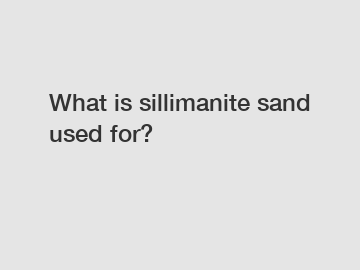What is sillimanite sand used for?
Sillimanite sand is a naturally occurring mineral that is used in a variety of industries for its unique properties. From its high melting point to its resistance to chemical corrosion, sillimanite sand has become a valuable resource for manufacturers around the world. In this article, we will explore the different uses of sillimanite sand and how it has become an essential component in various applications.
Properties of sillimanite sand.
Sillimanite sand is a type of alumino-silicate mineral that is commonly found in metamorphic rocks. It is characterized by its fibrous structure and high aluminum content, which makes it an excellent material for high-temperature applications. Sillimanite sand has a melting point of over 2500 degrees Celsius, making it ideal for use in industries that require extreme heat resistance.

Another important property of sillimanite sand is its resistance to chemical corrosion. This makes it an ideal material for use in chemical processing plants, where exposure to corrosive substances is common. Sillimanite sand is also known for its high thermal conductivity, which allows it to transfer heat efficiently and evenly.
Uses of sillimanite sand.
1. Refractory industry.
One of the primary uses of sillimanite sand is in the refractory industry, where it is used to manufacture high-temperature resistant materials. Sillimanite sand is commonly used in the production of refractory bricks, which are used to line furnaces, kilns, and other high-temperature equipment. The exceptional heat resistance and chemical stability of sillimanite sand make it an ideal material for these applications.
2. Foundry industry.
Sillimanite sand is also used in the foundry industry for its ability to withstand high temperatures and thermal shock. Foundries use sillimanite sand as a core and mold making material to create intricate castings. The high alumina content of sillimanite sand helps improve the strength and durability of the molds, leading to better quality castings.
3. Glassmaking industry.
In the glassmaking industry, sillimanite sand is used as a raw material for the production of high-quality glass products. Sillimanite sand helps improve the thermal properties of glass, making it more resistant to thermal shock and reducing the risk of breakage. Glassmakers also use sillimanite sand to create specialty glass products with enhanced strength and clarity.
4. Ceramic industry.
Sillimanite sand is a popular material in the ceramic industry due to its excellent thermal and chemical properties. Ceramic manufacturers use sillimanite sand to produce high-quality ceramic products such as tiles, sanitaryware, and refractory materials. The unique properties of sillimanite sand help improve the strength, durability, and thermal stability of the final ceramic products.
Conclusion.
Sillimanite sand is a versatile mineral that is used in a wide range of industries for its exceptional properties. From its high melting point to its resistance to chemical corrosion, sillimanite sand has become an essential material for manufacturers looking to improve the quality and performance of their products. Whether it's in the refractory, foundry, glassmaking, or ceramic industry, sillimanite sand continues to play a crucial role in various applications.
If you are interested in learning more about sillimanite sand and its uses, please do not hesitate to contact us. Our team of experts is always ready to answer any questions you may have and provide you with the information you need.
Want more information on Calcium Carbonate In bulk, sodium feldspar powder, sillimanite powder? Feel free to contact us.

Comments